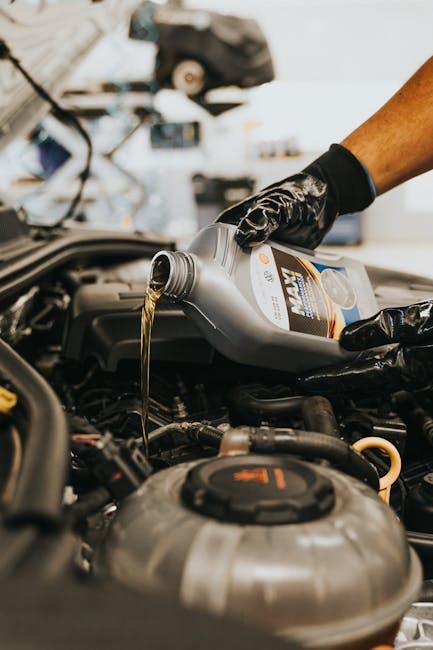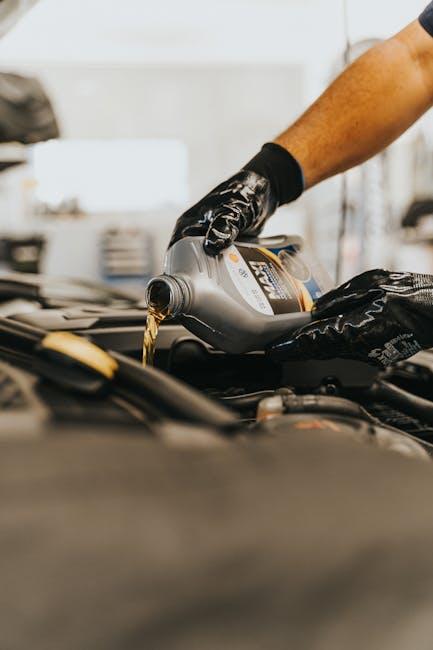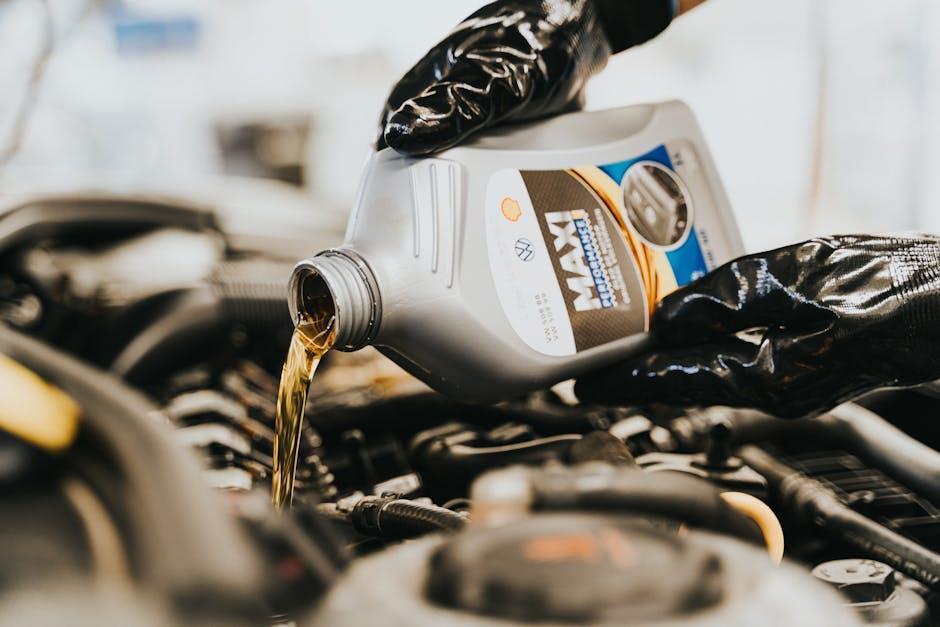Beneath the sleek exterior of every vehicle lies a complex machine, tirelessly working to get you from point A to point B. At the heart of this mechanical dance is the engine, a marvel of precision and power. Yet, like any finely tuned instrument, it demands careful attention and maintenance to perform at its best. Among the myriad of upkeep tasks, regular oil changes stand as a crucial ritual—often overlooked but indispensable. This article explores why timely oil changes are more than just routine chores; they are vital lifelines that keep engines humming smoothly, protect against wear, and extend the life of your trusted ride.
Table of Contents
- The Role of Engine Oil in Maintaining Optimal Performance
- How Old Oil Affects Engine Components and Longevity
- Signs Your Vehicle Needs an Oil Change Immediately
- Choosing the Right Oil Type for Your Engine’s Needs
- Step-by-Step Guide to Performing a Proper Oil Change
- Maximizing Engine Health Through Consistent Maintenance Practices
- Q&A
- The Way Forward

The Role of Engine Oil in Maintaining Optimal Performance
Engine oil acts as the lifeblood of your vehicle’s engine, performing a critical function beyond mere lubrication. It creates a thin, protective layer between metal components, minimizing friction and wear that can cause premature failure. As the engine operates under intense heat and pressure, the oil absorbs contaminants and disperses heat, preventing overheating and maintaining smooth performance. Without fresh oil, engine parts can seize or degrade rapidly, threatening overall vehicle reliability.
Beyond the mechanical shield it provides, engine oil also plays a pivotal role in:
- Cleaning: Suspends dirt and sludge, keeping the engine internals clean.
- Sealing: Enhances compression by sealing gaps between piston rings and cylinder walls.
- Corrosion prevention: Contains additives that protect metal surfaces from rust and oxidation.
| Oil Function | Impact on Engine |
|---|---|
| Lubrication | Reduces friction, prevents wear |
| Cooling | Dissipates engine heat |
| Cleaning | Removes sludge and deposits |
| Sealing | Maintains compression efficiency |
| Protection | Prevents rust and corrosion |

How Old Oil Affects Engine Components and Longevity
Over time, oil breaks down and loses its essential properties, turning into a gritty sludge rather than a smooth lubricant. This deterioration directly impacts critical engine parts such as pistons, cylinders, and bearings, increasing friction and accelerating wear. Without fresh oil, these components suffer from metal-to-metal contact, which can lead to overheating and premature failure. Moreover, old oil becomes saturated with contaminants like dirt, metal particles, and combustion byproducts, amplifying the abrasive effect inside the engine.
The consequences extend beyond just component damage. Degraded oil also hampers the cooling function and reduces the engine’s overall efficiency. Key issues caused by stale oil include:
- Reduced lubrication leading to increased friction
- Corrosion buildup from acidic compounds in oil
- Clogged oil passages restricting proper flow
- Decreased fuel economy due to engine strain
| Component | Effect of Old Oil | Impact on Longevity |
|---|---|---|
| Pistons | Scuffing and increased wear | Reduced engine compression |
| Bearings | Metal fatigue and surface degradation | Early bearing failure |
| Valve Train | Sticky deposits impairing movement | Irregular engine timing |

Signs Your Vehicle Needs an Oil Change Immediately
Ignoring the subtle signals your vehicle sends can lead to costly repairs down the road. When your engine oil starts to degrade or runs low, you might notice a gritty texture on the dipstick, which indicates contamination. Another common symptom is a burning oil smell—this usually means oil is leaking onto the hot engine parts, which calls for immediate attention. Don’t overlook the unexplained engine noise, such as knocking or ticking sounds, often caused by insufficient lubrication. These signs are your car’s way of asking for fresh oil to lubricate, cool, and protect vital components.
Additionally, dashboard alerts such as the oil change light or oil pressure warning should never be ignored. Pay close attention if your vehicle feels sluggish or exhibits poor fuel efficiency, as dirty oil can increase friction and reduce engine performance. To help you recognize these telltale signs quickly, here’s a simple overview of common symptoms along with their potential causes:
| Symptom | What It Means | Urgency |
|---|---|---|
| Dirty or gritty oil | Oil contamination, losing lubricating power | High |
| Burning smell | Oil leaks on hot engine parts | High |
| Engine noise | Low oil level causing poor lubrication | High |
| Oil change light | Service interval reached or oil issues | Medium |
| Decreased fuel economy | Thick or dirty oil reducing efficiency | Medium |

Choosing the Right Oil Type for Your Engine’s Needs
Selecting the proper oil type is a pivotal decision in preserving your engine’s longevity. Different engines have different requirements based on their design, age, and operating conditions. For instance, synthetic oils offer superior protection at extreme temperatures due to their enhanced molecular stability, making them ideal for high-performance or newer engines. Meanwhile, conventional oils remain effective for older or less demanding engines, offering reliable protection at a lower cost. Understanding the viscosity rating is also crucial; oils with higher viscosity numbers tend to be thicker, providing a better seal but potentially reducing fuel efficiency in colder climates.
Here are key factors to consider when choosing the right oil type:
- Engine Manufacturer Recommendations: Always consult your owner’s manual for approved oil grades.
- Operating Conditions: Harsh climates or heavy towing may require specialized oil formulas.
- Oil Additives: Some oils include detergents and anti-wear agents that boost engine cleanliness.
| Oil Type | Best For | Key Benefit |
|---|---|---|
| Synthetic | Modern, High-Performance Engines | Superior High-Temp Stability |
| Conventional | Older Engines, Basic Use | Cost-Effective Protection |
| Synthetic Blend | Daily Drivers, Moderate Use | Balance of Performance & Price |

Step-by-Step Guide to Performing a Proper Oil Change
Begin by warming up your engine for a few minutes; this helps the oil flow out smoothly and removes dirt and grime more effectively. Next, securely lift your car using a jack and place it on jack stands for safety. Slide an oil catch pan underneath the oil drain plug, then carefully unscrew the plug with a wrench to let the old oil drain completely. While the oil drains, replace the oil filter — this important step ensures your engine stays clean and lubricated. Remember to lubricate the rubber seal of the new filter with fresh oil before installation to ensure a tight, leak-proof fit.
Once drained, replace the drain plug and tighten it securely but avoid over-tightening to prevent damage. Next, use a funnel to pour in the recommended oil type and quantity specified in your vehicle’s manual. After adding oil, check the level with the dipstick and adjust if necessary. Finally, start the engine and let it run for a few minutes, checking under the car for any signs of leaks. Recheck the oil level after the engine has been off for a few minutes, topping up if needed. Your car is now ready for a smooth and efficient ride!
| Step | Tools Needed | Estimated Time |
|---|---|---|
| Drain Old Oil | Wrench, Oil Pan | 10 minutes |
| Replace Oil Filter | Oil Filter Wrench | 5 minutes |
| Add New Oil | Funnel, New Oil | 5 minutes |
| Check for Leaks & Oil Level | Dipstick | 5 minutes |

Maximizing Engine Health Through Consistent Maintenance Practices
Consistent upkeep is the cornerstone of a thriving engine, and among the myriad maintenance tasks, regular oil changes stand out as the most critical. Engine oil acts as the lifeblood of your vehicle, reducing friction between moving parts, preventing overheating, and flushing out harmful debris. Neglecting to replace old, degraded oil can lead to sludge buildup and corrosion, which ultimately damages delicate engine components. By adhering to a routine oil change schedule, you ensure that your engine operates smoothly, maintains optimal fuel efficiency, and enjoys an extended lifespan.
To truly maximize engine health, consider these maintenance habits in addition to regular oil changes:
- Use high-quality oil and filters: Superior products provide better protection and durability.
- Monitor oil levels regularly: Detect leaks or consumption issues early.
- Follow manufacturer’s recommended intervals: Tailored schedules based on engine design and driving conditions.
- Complement oil changes with other routine checks: Inspect belts, hoses, and coolant for balanced engine care.
| Maintenance Task | Recommended Frequency | Benefit |
|---|---|---|
| Oil Change | Every 5,000-7,500 miles | Optimal lubrication and debris removal |
| Oil Level Check | Monthly | Prevents low oil damage |
| Filter Replacement | With every oil change | Maintains oil purity |
Q&A
Q&A: The Importance of Regular Oil Changes for Engine Health
Q1: Why is engine oil so critical to my car’s performance?
A1: Think of engine oil as the lifeblood of your vehicle. It lubricates the moving parts inside the engine, reducing friction and preventing overheating. Without clean oil, those parts grind against each other, causing wear and potentially severe damage.
Q2: What happens if I skip or delay an oil change?
A2: Skipping oil changes turns clean, smooth-running oil into a gritty sludge. This sludge clogs engine parts, impairs lubrication, and can lead to overheating. Over time, this neglect can cause decreased fuel efficiency, poor engine performance, or even complete engine failure.
Q3: How often should I change my engine oil?
A3: It depends on your vehicle and driving habits, but a common rule of thumb is every 3,000 to 5,000 miles for conventional oil and up to 7,500 miles or more for synthetic oil. Check your owner’s manual for the manufacturer’s recommendation—it’s tailored for your engine’s needs.
Q4: Can I just top off the oil instead of changing it?
A4: Topping off helps maintain oil levels but doesn’t replace old, contaminated oil. Over time, oil breaks down and accumulates dirt and metal particles. Only an oil change clears out the old oil and allows fresh oil to work its magic.
Q5: Does using synthetic oil mean I can forget about regular oil changes?
A5: Synthetic oils last longer and perform better under extreme conditions, but they don’t eliminate the need for regular changes. Even synthetic oil gets dirty and degrades. Follow the recommended intervals for your vehicle and oil type.
Q6: How can I tell if my oil needs changing?
A6: Besides sticking to a schedule, look for signs like dark, dirty oil on the dipstick, unusual engine noises, or a burning smell. Some modern cars have oil life monitors that alert you when it’s time to change.
Q7: What are the long-term benefits of keeping up with oil changes?
A7: Regular oil changes extend your engine’s lifespan, improve fuel efficiency, reduce emissions, and save you money on costly repairs. In a way, it’s like giving your engine a regular spa treatment—keeping it clean, cool, and happy.
Q8: Can DIY oil changes be as effective as professional ones?
A8: Yes, if done correctly. DIY oil changes require the right tools, oil grade, and proper disposal of used oil. However, professionals offer convenience and can spot other potential issues your engine might have during the service.
Q9: Is changing oil environmentally important?
A9: Absolutely. Used oil can contaminate soil and water if disposed of improperly. Recycling and disposing of used oil responsibly helps protect the environment while keeping your engine clean.
Q10: What’s the takeaway message about oil changes?
A10: Regular oil changes are a simple, crucial step in caring for your engine’s health. They keep your car running smoothly and reliably, saving you from unexpected breakdowns and costly repairs. In essence, oil changes keep the heart of your vehicle beating strong.
The Way Forward
In the intricate dance of engine components, oil is the silent partner—quietly reducing friction, dissipating heat, and flushing away impurities. Regular oil changes are not just routine maintenance; they are an essential ritual that preserves the heartbeat of your vehicle. By committing to timely oil changes, you extend the life of your engine, enhance performance, and avoid the costly consequences of neglect. In the grand symphony of automotive care, consider oil changes the melody that keeps your engine running smoothly, mile after mile.

